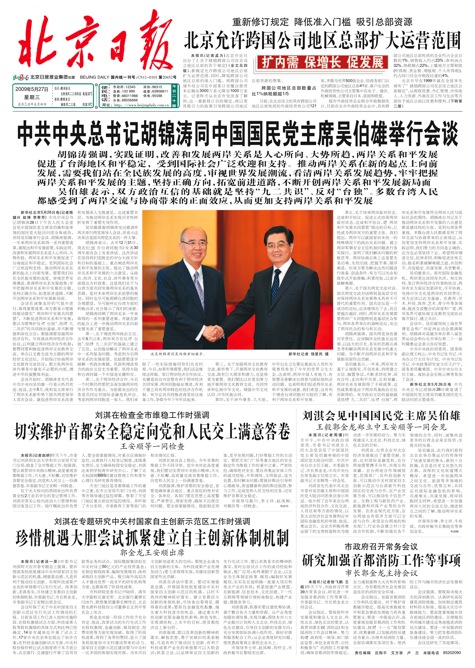By David Bandurski — It’s no secret that coverage of the 20th anniversary of the June 4th crackdown in Beijing is off limits to China’s media. But that doesn’t exactly mean China is passing the anniversary in silence. If you read China’s newspapers closely, in fact, you’ll realize a great deal is being said — and more to the point, done — about this highly sensitive anniversary. [Frontpage Image: “Tiananmen,” by Mayakamina available at Flickr.com under Creative Commons license.]
The whole nation has sprung into action — police action, that is.
On the front page of today’s Beijing Daily, the official mouthpiece of top municipal party officials, the June 4th anniversary screams through dry official-speak about routine party business.
An article just below the main news bit about Hu Jintao’s meeting with Taiwan Kuomintang party chairman Wu Poh-hsiung concerns Beijing’s high-priority push to strengthen its “stability preservation work” (维稳工作).
“Stability preservation,” or weiwen, has been a major buzzword in 2009, signaling the party’s resolve to maintain social stability in the face of a series of highly sensitive anniversaries. Among these anniversaries, June 4th is obviously one of the real humdingers.

[ABOVE: Front page of today’s official Beijing Daily, with news below the main article (with photo) of Secretary Liu Qi’s inspection of “stability preservation work” in the capital.]
The Beijing Daily article paints an important, if impressionistic, picture of current efforts to bolster security ahead of the June 4th anniversary. Security, for example, has reportedly been heightened in and around Peking University, and police and government departments have been placed on a high level of alert.
Whatever assertions might be made about the irrelevance of June 4th for young Chinese today, the official language of “stability preservation work” underlines the ongoing importance of the 1989 protests in the party’s own mind.
Clearly, officials at every level are under the strictest orders to take the anniversary very seriously. And one must wonder: why is a generation of ostensibly indifferent university students of such concern to Beijing’s party secretary?
As a final note, it is interesting to see leaders referencing the Beijing Olympics as an important precedent for successful “stability preservation work.”
A translation of the Beijing Daily article follows:
Yesterday afternoon, Beijing party secretary Liu Qi (刘淇) paid visits to Peking University and to the Tiananmen division of the municipal public security bureau to inspect stability preservation work (维稳工作) for the whole city. He emphasized the need to conscientiously carry out the spirit of the Central Party’s instructions, giving the highest level of priority to stability preservation work in the capital, to not be careless, to not relax, working seriously to preserve safety and security in the capital city, living up to the expectations of the party and the people.
The Yanyuan (燕园) Police Station, located in the heart of the Peking University campus, is responsible for managing registration of the school’s 20,000 or so students. Liu Qi expressed particular concern for the work of managing the transient population (流动人口) on campus and with registering all visitors. He urged personnel at the [Yanyuan] police station to have a full grasp of the situation, maintaining surveillance of key areas, seriously carrying out entry and exit registration for the campus (入校登记制度), exercising responsibilities in a regimented fashion, going all-out to ensure the safety and stability of the campus.
The Tiananmen district is the area of most urgent priority for stability preservation work in the capital city, and at the Tiananmen division of the municipal public security bureau Liu Qi and other city leaders scanned the security situation at key points around Tiananmen by means of video monitoring terminals. They also heard reports on the [security] situation from the municipal public security bureau, the party’s municipal education committee and other relevant departments.
At this forum, Liu Qi pointed out that stability preservation work in the capital this year has been unlike previous times, with the central party giving this [work] a high level of attention. We must conscientiously carry out the spirit of the Central Party’s instructions, giving the highest level of priority to stability preservation work in the capital, to not be careless, to not relax, working seriously to preserve safety and security in the capital city, living up to the expectations of the party and the people.
Liu Qi emphasized that preserving safety and security in the capital relied first and foremost on ensuring absolute security in key districts and in key positions (重点地区, 重点部位). Various work units and departments must maintain a high level of alert, be strict in carrying out responsibilities, plan thoroughly, and make sure no problems whatsoever appear. [They] must keep a firm grasp of the situation, plan early on for contingencies, discover problems at the first possible moment, and be proactive in carrying out stability preservation work. The safety and security of Tiananmen Square and other key areas is the first and most important priority — they must be rigidly controlled and kept absolutely secure. We must appropriate our successful experiences [in stability preservation] during the Olympic Games, keeping a cool and rational attitude, acting in a civilized manner and according to law, resolving problems quickly. We must adequately guide public opinion and be mentally persuasive, creating a healthy and harmonious public opinion environment . . .
[Posted by David Bandurski, May 27, 2009, 8:45pm HK]




















